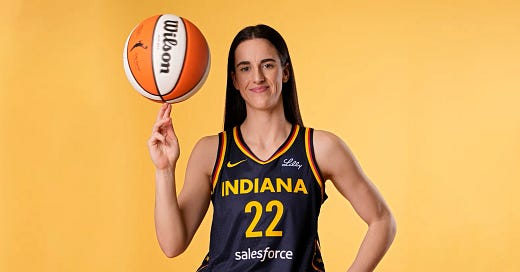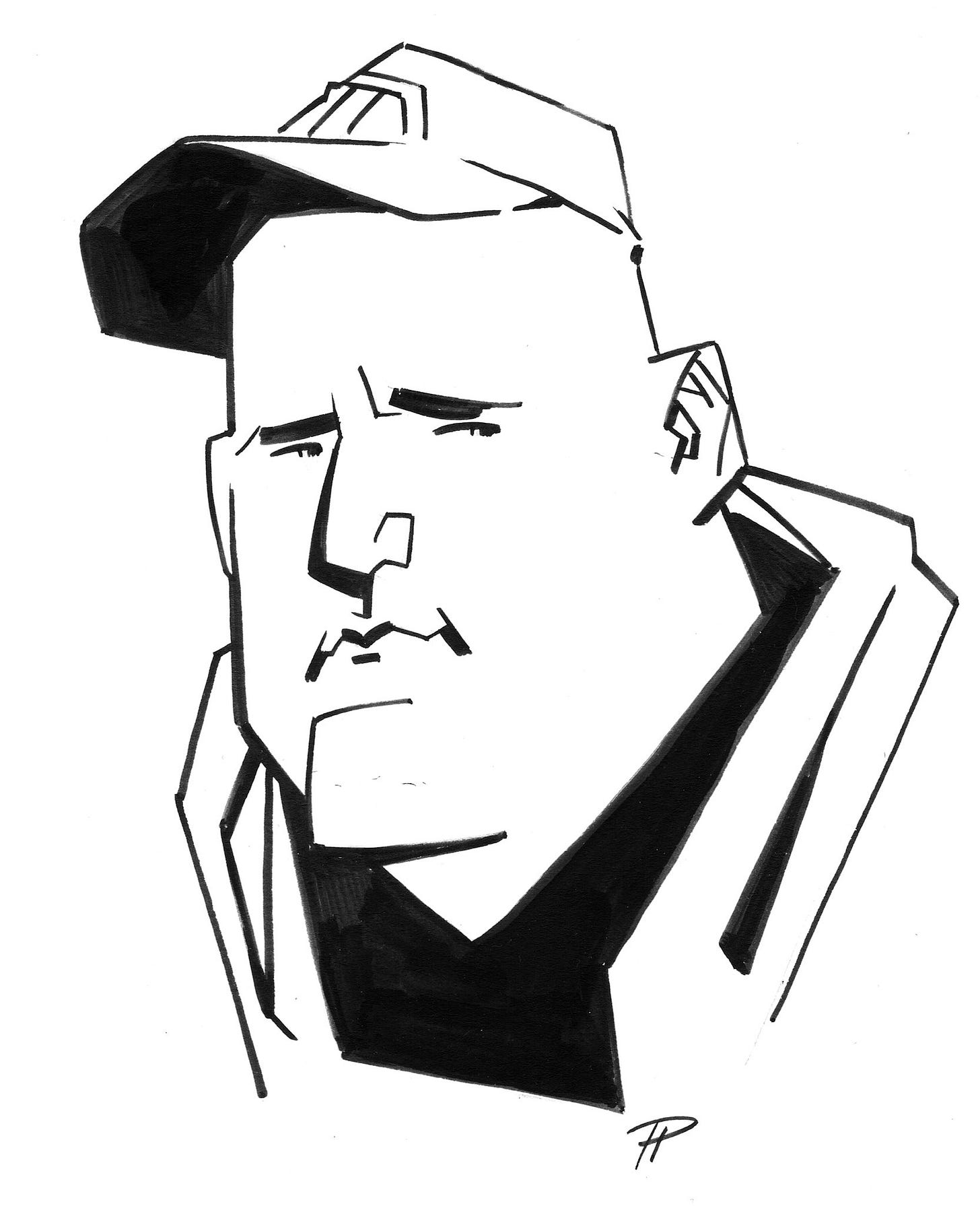Are other WNBA players tired of the Caitlyn Clark Effect?
The WNBA has long overmarketed white players in a league more than 60% Black
A cheap hit late in the third quarter of the Chicago Sky’s game against the Indiana Fever on Friday night exposed the other side of the Caitlin Clark Effect.
Chicago’s Chennedy Carter hit a jumper to bring the Sky within four points with less than 30 seconds left in the third quarter of the Sky’s game at Indiana on May 31, .
Indiana took the ball out. Clark stood a few steps away from the baseline awaiting the inbound pass.
Carter slammed her shoulder into Clark, knocking Clark to the floor. Replays showed Carter saying what appeared to be an expletive before the contact.
A foul was called. Fans booed. The game moved on. Indiana won.
Clark told reporters, “That’s just not a basketball play.”
Carter told reporters, “I ain’t answering no Caitlin Clark questions.”
But there are questions to be answered.
Was Carter’s beef against Clark for some in-game trash talk? In the previous Fever possession, Clark can be seen jawing toward Carter after a Fever score.
Or was Carter’s hip thrust really being directed at the fans and league who have cheered Clark and celebrated her career-to-date achievements while ignoring or underplaying those of athletes who have accomplished more on the professional level?
Was Carter’s outburst a sign of jealousy or shortsightedness?
Clark became the face of the 27-year-old league before the Indiana Fever even selected her as the No. 1 pick in this year’s draft.
Here in the Hawkeye State, Clark is a beloved folk hero on par with Chuck Long, Dan Gable, and Fred Hoiberg.
This makes sense. Clark set the Division I basketball scoring record — men’s and women’s — often by sinking shots from unbelievably long range.
Clark sold out not only every game at Carver-Hawkeye Arena, but also every road game in which she played. The women’s national championship game drew more viewers than the men’s championship.
The WNBA marketing gurus would be fools not to tap into that charisma. For Iowans, it’s pure joy to see one of our own, a kid from West Des Moines, be the center of the sports universe.
But there is another side to the Caitlin Clark Effect, which has nothing to do with Clark personally, but is a reminder that many Americans would rather root for white women a lot more than Black women.
Yes, I’m writing about race.
No, I’m not calling everyone who cheers for Caitlin Clark a racist.
My dad and I have watched all but one of Clark’s WNBA games together. It’s been lovely father and son bonding over women’s basketball.
We are not watching these games because we are racists. We started watching Clark’s Iowa games on TV this winter after Mom died. It was something we could enjoy together during our grief.
This does not mean that there isn’t a racial issue with the WNBA. Since its founding in 1996, the WNBA has consistently marketed white players over Black players, a dubious distinction that continues to today.
Sabrina Ionescu, Kelsey Plum, and Breanna Stewart, all white players, see more league marketing time than Black players such as Las Vegas Aces’ A’ja Wilson, Jonquel Jones of the New York Liberty, or the Phoenix Mercury’s Kahleah Cooper.
Some 63.8% of WNBA players identified as Black in 2023 while 19.1% of players identified as white.
Consider a recent CarMax ad that featured retired Seattle star Sue Bird, Ionescue, and Wilson; two white players and one Black — almost a complete reversal of the league’s actual makeup.
None of this is Clark’s fault. Race problems in America existed long before any of us were born. She doesn’t decide what the media covers or who gets marketed.
And there must be something special about Clark. Even with overmarketing white players for 27 years, teams didn’t get private planes until Clark entered the league.
Clark can only control her play and she’s playing well in her first season. She averages 16.9 points a game which is good for 16th in the league through her first 10 games.
For perspective, Dallas Wings guard Arike Ogunbowale leads the league with 27.5 points per game and Las Vegas center Wilson averages 26.5 points per game.
Still, the headlines all seem to be about Clark. She’s the star of the league playing for a poor performing team; the Fever were 2-8 through the end of May.
I don’t know why Chennedy Carter knocked Clark down. We encourage empathy at the middle school where I teach. Empathy requires us to put ourselves in other people’s high tops.
If I were a Black player in the WNBA and the only player anybody was talking about was a white kid who hasn’t proven anything in the pros, I would strongly suspect the issue is race.
This doesn’t excuse Carter’s foul, but I could understand a Black player in her fourth year in the league would get sick of a white rookie getting all the attention.
Yet, the WNBA needs Clark’s star power. Nobody paid attention to the WNBA with this level of intensity before Clark arrived.
In the end, the ultimate measure of the Caitlin Clark Effect will be if more people are tuning in and cheering for teams other than Fever and players other than Clark.
Then we’ll truly know if her rising star shines a light on all.
Daniel P. Finney, a member of the Iowa Writers Collaborative, wrote for newspapers for 27 years before being laid off in 2020. He teaches middle school English now. Please consider a paid subscription.







Thoughtful, well-organized analysis. You put yourself in someone else’s high tops. Resentment toward the white newbie who gets all the headlines would be an understandable reaction. You’re also correct that Clark is benefiting all the previously underpaid, undervalued experienced players and teams.
I'm not sure that I know enough about the WNBA, or sports promotion in general, to intelligently express my reaction to your article and I'm still going to try. One of my very dearest friends from way back to junior high is the mother of Candace Parker. Did you know that Candace's mother is from Des Moines? Did you know her father played for Iowa State back in the 70s? Do you know who Candace Parker is? I think that in her early days of college basketball and in her WNBA career Candace was a "big deal" like Caitlin Clark. She is still a "big deal" in the WNBA and recently announced her retirement. I'm sure that she was widely known in her home state of Illinois and in the Chicago area where she grew up. I'm confident that Candace is well known to those who follow the WNBA and in the states where she has played professionally. I doubt many know of her in Iowa or nationally in the same way that we do Caitlin Clark. Candace is black. Iowa has a very direct connection to her and that has never, to my knowledge, been made public. Why is that? It's not the close connection like Clark playing for an Iowa team and, yet, don't we often, as Iowans, make a fuss over anyone close to greatness if they have an Iowa connection? Every outstanding woman athlete that has elevated the sport deserved and deserves the attention and promotion that Caitlin Clark has received. It makes sense that there would be hard feelings when, once again, we may have failed to recognize and promote the hard work and talent of others and the glaring factor appears to be race. It's complicated and we need to keep working on it.